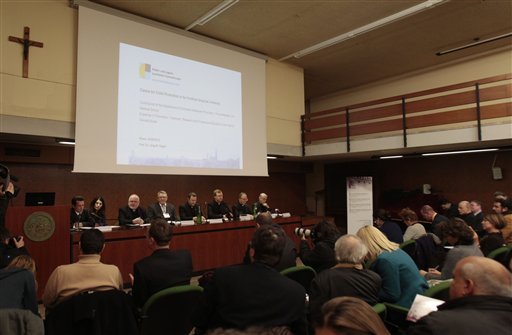 A four day symposium at Rome’s Gregorian University entitled ‘Towards Healing and Renewal’ concludes on Thursday with the launch of an internet portal in English, Spanish, Italian and German, providing information and training for all those dealing with child protection in the Church.
A four day symposium at Rome’s Gregorian University entitled ‘Towards Healing and Renewal’ concludes on Thursday with the launch of an internet portal in English, Spanish, Italian and German, providing information and training for all those dealing with child protection in the Church.
Participants at the meeting included representatives of bishops’ conferences from over 100 countries around the world, as well as seminary rectors and heads of male and female religious congregations.
There is no doubt that this conference marks a milestone in the Catholic Church’s approach to the problem of clerical sex abuse. Though many bishops may already have sat down with survivors to hear their painful stories, others told the closed door meeting they just didn’t think it was a problem in their part of the world. After hearing a first hand account from an Irish abuse victim, plus detailed analysis from experts in many different countries, no church leader can be in any doubt that this is one of the most serious challenges he’s expected to confront. Bishop Declan Lang is vice-chairman of the UK’s National Catholic Safeguarding Commission.
“We realise that this is a problem for the whole church.. I think there has been a seriousness and a realisation that child abuse wounds not only the victims, but families, parishes and the wider community”
The launch of a multilingual internet ‘Centre for Child Protection’, based in the Pope’s former archdiocese of Munich and Freising, aims to help all bishops, priests and pastoral leaders develop a global approach to the problem of abuse, not just within the Church but within wider society as well. Funded by different dioceses, plus private sponsors and a donation from the Papal Foundation, the programme is designed to run over an initial three year period and draws on the scientific support of experts from Germany’s University Clinic of Ulm as well as the Department of Psychology at the Pontifical Gregorian University.
Many of the bishops I’ve spoken to are enthusiastic about the resources they’ll now have to help them tackle the problem of abuse in their own dioceses and their own, very different, cultural contexts. Archbishop Luis Antonio Tagle heads the diocese of Manila in the Philippines..
“We come here as people who are willing to learn – not many of us bishops fully understand this phenomenon so we are happy to learn and share the resources…we also realise that cultures differ, laws differ so what each of us will do is try to move in the same direction …but in the local context”





